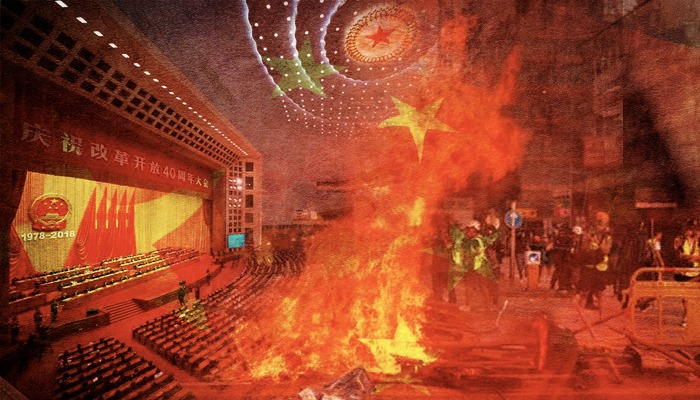The Government of the Hong Kong Special Autonomous Region has announced its opposition to the US’ recently passed law on the protection of human rights and democracy in Hong Kong. On November 27, US President Donald Trump signed the Hong Kong Human Rights and Democracy Act of 2019 into law.
The essence of the law
The Hong Kong Democracy and Human Rights Act requires the US Administration to submit a regular annual report on the situation in the autonomous region and, if necessary, to impose sanctions on those responsible for “human rights violations”. The report will review Hong Kong’s “degree of independence,” in order to adjust trade agreements with the region accordingly.
In addition, Trump signed an act prohibiting the supply of police equipment used against protesters. Thus, any police action to enforce order can now be interpreted as a “human rights violation.”
The protests in Hong Kong have long been openly violent. The demonstrators throw Molotov cocktails at the police and have destroyed businesses they consider pro-Chinese. The most prominent event was the confrontation at the Polytechnic University, where homemade bombs, brick catapults and even Bow and arrows were used against the police.
Nevertheless, protesters and Western media accuse the police of cruelty.
In the event of further controversy, Washington may now revoke Hong Kong’s special status in when it comes to trade with the United States. The law, according to the US, will also provide guarantees for Hong Kong residents to obtain visas to enter the US in case of persecution by the Chinese authorities.
A parade of U.S. flags as #hongkong rally plays messages of support from U.S. lawmakers pic.twitter.com/q1LTzOhK3T
— Annie Wu (@annieeenyc) November 28, 2019
Hong Kong and China oppose the US law
Both Hong Kong and China heavily criticized the US initiative as an act of open interference in Hong Kong’s internal affairs, suggesting the decision will harm their relationships with Washington.
The Chinese Foreign Ministry also said that the United States would face countermeasures if the law were put into practice. In Beijing, Washington’s decision is being called hegemonic.
Many experts note tha,t in addition to the trade war, these steps fall within the framework of the ongoing US disinformation campaign to attack and discredit China. The US is attempting to portray China as an “evil empire” – the coverage of protests in Hong Kong by liberal media shows Beijing as a demonic totalitarian country, often keeping silent about violations of the law by the protesters themselves. Now, Washington will be publishing official reports on the “horrors” in China once a year to manipulate trade arrangements and conduct ideological warfare, as well as to justify imposing restrictions and sanctions.
War means war
China has become a real problem for the United States. As Americans (or, more precisely, some representatives of parties and elites) continue to resist the realization of a multipolar world, they are forced to increase their pressure on China on all fronts, to use military-political and economic instruments, and most importantly, to try to undermine China from within via Hong Kong and other painful points.
Happy Thanksgiving Day with warm wishes from ???????? #HongKong! Thank you! pic.twitter.com/xd3hsMU33a
— Emmy Lo (@EmmyLo9) November 28, 2019
However, it should be clear that Trump had no options in this regard. Even if Trump wanted to avoid confrontation (and he was trying to, as evidenced in the fact that he didn’t commented on the protests in Hong Kong for a long time), US law would have acted independently. Trump could only veto the first stage, but legislators would still pass the anti-Chinese law at the second hearing.
Experts believe that the adoption of this law may seriously complicate the ongoing negotiations between China and the United States to overcome trade conflicts. Trump would likely prefer to make a “profitable deal” rather than exert direct globalist pressure on his opponent. Trump is not interested in ideology, focusing instead on pragmatic benefits.
The blow to the economy
Against the backdrop of protests in Hong Kong, the region’s shares fell to their lowest level in two weeks on Friday, leading to losses in Asian financial markets, media reported.
Despite the situation, investors are counting on pragmatic decisions, which will be in the interests of both Washington and Beijing to ensure the conclusion of a trade deal.
China’s actions
Hong Kong made the concessions protestors demanded, but it didn’t help. On September 4, Lam announced the withdrawal of the draft law on extradition, which ostensibly sparked the protests to begin with. However, demonstrators now insist on the implementation of new requirements, including an independent investigation of police actions during the June 12 rallies and the introduction of direct general elections for the district administration and the legislative assembly.
Thus, a strategy of concessions will not work: the pro-Western protests will require more and more, up to and including the separation of Hong Kong from China. Moreover, China is in a stressful situation after the success of the opposition in the local elections of 17 out of 18 local councils.
https://twitter.com/SenRichardBLon1/status/1200267036011716608
How is Hong Kong fundamentally different from China? Some articles rightly highlight the role of China’s strong traditional educational system.
“They believe that because the people, especially the young people, in Hong Kong never received patriotic education, they lack of this kind of national identity,” a Seton Hall University professor Zheng Wang said in WP.
As concessions and re-education will not work in the short term, Beijing is experiencing other strategies that include reshuffles and stricter measures.
Hong Kong, as a territory of China, remains an important intermediary for trade with other countries. To rid itself of this dependence, China has announced plans to lift restrictions on foreign stakes and quotas on foreign investment in securities.
However, Beijing is not going to lose its own territory and weaken its regional hold. The Chinese authorities have already established a crisis headquarters in Shenzhen to monitor, meet and resolve the situation in Hong Kong.
Beijing is considering replacing Wang Zhimin as head of the Central People’s Government Office in Hong Kong because it is dissatisfied with the effectiveness of the government.
Meanwhile, China’s Foreign Ministry has summoned Terry Branstad, the US ambassador to Beijing, to protest strongly on behalf of the government and people of the republic against the actions of US leadership aimed, and their efforts to undermine the prosperity and stability of Hong Kong, damaging the principle of “one country, two systems.”
According to China’s assessment, the US openly supports the perpetrators of the violence who are destroying infrastructure, obstructing civilians, undermining the rule of law and disturbing the public order.
Earlier, on November 19, the Chinese government replaced the head of police of this special administrative region of China. The new chief of police was nominated by the head of the Hong Kong administration, Carrie Lam.
According to Brian Fong, a social scientist at the Education University of Hong Kong (WP publication), the Chinese government has two options for bringing the people of Hong Kong closer to the mainland:
– to make Chinese identity “more attractive,” what includes opening and liberalising China itself
– to step up Chinese control over schools and the media of Hong kong.
The first option, given the strong Chinese ties (national, family and personal, with strong mutual support and indifference to other cultures), seems unrealistic. The second is more likely – so far, it seems that the only way to retain control over Hong Kong is to use the sticks more often than carrots. Given the history of US intervention and the upcoming sanctions/restrictions, it will be difficult to do so in silence. This strategy will possible only if the Chinese find a way to combine the rigor of the rules with

















Leave a Reply